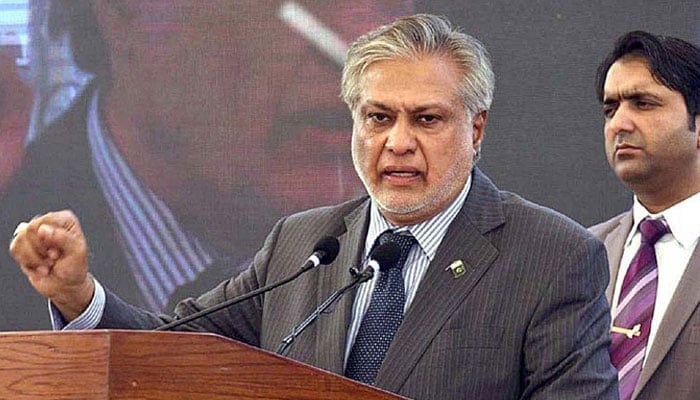Dr Khaqan Najeeb says not possible to raise additional revenue without targeting agriculture, real estate sectors

Finance Minister Ishaq Dar addressing a conference in this undated picture. — APP/File
ISLAMABAD: In the wake of total accumulated losses of more than Rs600 billion, the government is considering hiring experts to prepare a time-bound restructuring plan through shadow management. The national flag carrier PIA has reached a situation where it cannot run its operation for a single day without provision of cash from the national kitty.
“Now PIA has come up with a plan to include Boeing-777 in its fleet by securing a plane on a lease after which the number of planes will come at 11. However, the overall financial position of the PIA is so bleak that it is left with no other option but to make time-bound restructuring plan and then divide the PIA into three to four companies. The core business of airline must be separated with other operations of engineering, kitchen and others,” top official sources confirmed while talking to The News here on Saturday.
The PIA management held a meeting with Minister for Finance Ishaq Dar here at the Finance Division in Islamabad and discussed the future roadmap to revive the national flag carrier. It was also highlighted in the official meeting that the PIA could not be privatised under the ambit of latest law enacted by parliament in 2016 as it was converted from statutory body to corporatisation.
“The financial position of the PIA is so bleak that it could not pay $50 million navigation charges to Saudi Arabia, so they at one point had barred the national flag carrier to continue its operation after June 30, 2023,” said one top official in background discussions and added that the PIA would be closed down on the day when the government stopped injecting money into the loss-making entity.
The official wondered that how long such a loss-making PIA will continue its operations and added that first of all, there was a need to plug the leakages, prepare a time bound restructuring plan and privatise its major operations in a phased manner.
Meanwhile, Federal Minister for Finance and Revenue Ishaq Dar’s reiteration that there was no plan to bring agriculture and construction sectors under the tax net contradicts the International Monetary Fund (IMF)’s statement that the two sectors were undertaxed and could be fully brought into the tax net if the need arises to generate additional revenues. The minister Saturday tweeted that there would be no more taxes on agriculture and construction sectors.
There might be no need of additional revenue measures at present but if the need arises on the occasion of first or second reviews under the existing $3 billion Standby Arrangement (SBA) programme for nine months period, then undertaxed sectors like agriculture and construction would be considered as major revenue spinners in the future.
The World Bank has already done an analysis of different sectors of the economy, so the agriculture and construction would be fully brought into the tax net in the future at time of any additional revenue measures related requirements to bridge the gap between revenues and expenditures.
Ironically, tax collection in Punjab and Sindh of the agriculture sector, which contributes over 22 percent in the GDP growth, stood at meagre amount of just Rs4 billion per annum.
In the letter of Intent (LoI) dully signed by Ishaq Dar and SBP Governor Jamil Ahmed, which was tabled before the IMF’s Executive Board on the occasion of granting approval of $3 billion under the SBA programme, it is written that FY24 budget: “Parliamentary approval of a FY24 budget in line with IMF staff agreement to meet programme targets (prior action for programme approval).
“Passed by the National Assembly on June 25, 2023 and signed into law by the president on June 26, 2023, our FY24 budget advances fiscal consolidation through a primary surplus of Rs401 billion (0.4 percent of GDP) — built on a set of credible measures that help: (i) sustainably raise additional revenue by targeting undertaxed sectors (such as agriculture and construction), broaden the tax base, and improve progressivity; and (ii) restrain non-priority spending (including through energy sector measures aimed at credibly containing energy sector subsidies, the public wage bill, and pensions) while making fiscal room to protect the generosity level of the Benazir Income Support Programme (BISP) Kafalat programme. As in previous years, we are also working with the provinces to sign Memoranda of Understanding (MoUs) with the federal governments on their provincial fiscal targets consistent with the FY24 budget.”
Dr Khaqan Najeeb, former Ministry of Finance adviser, said it is not possible to raise additional revenue without targeting the undertaxed sectors, including agriculture and real estate.
Agriculture remains a main employer of the economy with more than 35 percent of the workforce and 22.7 percent of GDP. Estimated collection for FY23 across the country from agriculture income tax is less than Rs4 billion with Punjab contributing Rs2.85 billion and Sindh Rs0.44 billion. Provincial governments can significantly increase their tax-to-GDP through direct taxes like the agricultural income tax and urban immoveable property tax.
He felt that a substantial raise in the flat tax rates in agriculture is required given the income per acre has increased over the years, with irrigated lands to be charged at a much higher rate. On the property, serious research is required to levy a capital gains tax on the marginal rate, and some kind of land tax along with correction in property valuations. The domestic revenue mobilisation of Pakistan is currently heavily skewed towards the industrial sector -- something we have to seriously reform, the economist said.











